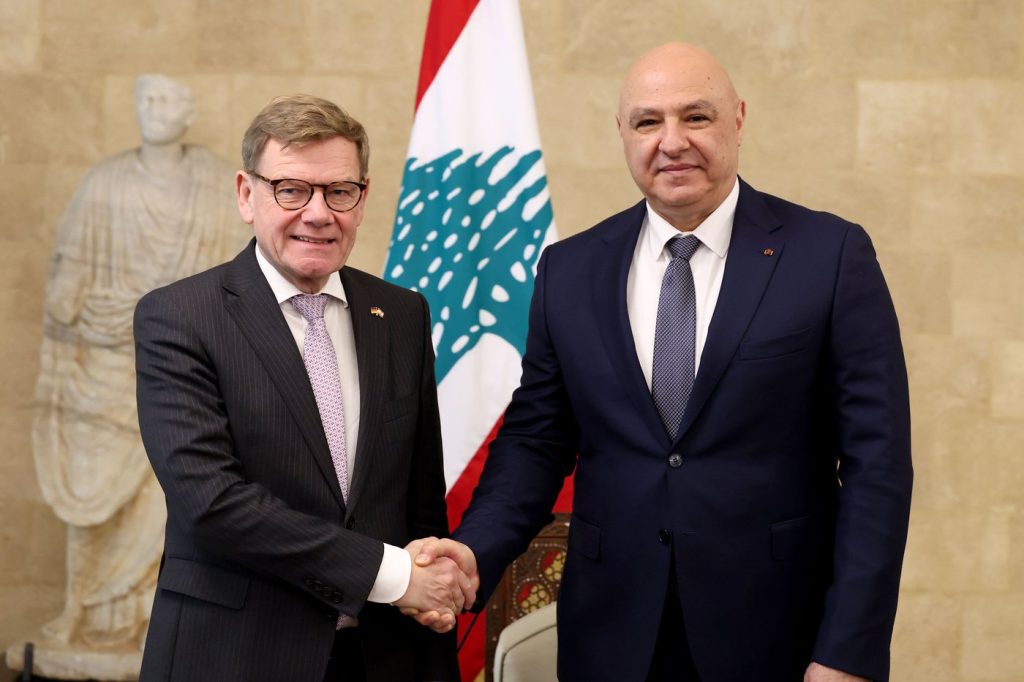BEIRUT (AP) – Lebanon’s President Joseph Aoun stated on Friday that any discussions with Israel aimed at halting its ongoing strikes on southern Lebanon must be mutual. These strikes have persisted despite a U.S.-brokered ceasefire that has been in place for nearly a year.
Aoun’s comments were made after a meeting with German Foreign Minister Johann Wadephul, who is on a four-day visit to the Middle East and was in Beirut for his first official trip since taking office. The visit coincides with an escalation of Israeli military operations in southern Lebanon, as both Israel and Lebanese officials have accused each other of violating the previously established ceasefire, which was agreed after the most recent Israel-Hezbollah conflict last November. This conflict began following the Hamas-led attack on Israel on October 7, 2023, which subsequently escalated into the Gaza war.
In a show of solidarity, Hezbollah initiated rocket attacks on northern Israel to support Hamas and the Palestinian cause, prompting retaliatory Israeli airstrikes. The ongoing exchanges have since developed into a full-scale war, which escalated further in September 2024.
After the ceasefire agreement, Israeli forces have engaged in near-daily strikes in southern Lebanon, claiming they are targeting Hezbollah militants and their infrastructure, including weapon depots and command centers. However, Lebanese officials assert that these strikes have often hit civilian areas, causing significant damage to infrastructure not linked to Hezbollah’s activities. Lebanese authorities have repeatedly called for an Israeli withdrawal from Lebanon and respect for their sovereignty.
On Friday, Israeli strikes in several locations across southern Lebanon reportedly resulted in the deaths of at least two individuals, as noted by the state-run National News Agency. An Israeli military spokesperson confirmed the death of a man implicated in efforts to rebuild Hezbollah's infrastructure.
In a rare ground operation on Thursday, Israeli troops conducted a raid on a municipal building in Blida, a border village, resulting in the death of Ibrahim Salameh, a municipal employee. This action drew criticism from Lebanese officials and spurred protests among local residents. The Israeli army justified the raid by asserting that it aimed to dismantle terrorist infrastructure associated with Hezbollah.
President Aoun emphasized to Wadephul that Lebanon is ready for negotiations to end the Israeli occupation, but insisted that these discussions must not be one-sided. He mentioned that mutual willingness is crucial, something he feels is currently lacking. The specifics regarding the format, timing, and location of any potential negotiations will be determined later.
Aoun also indicated that the Lebanese army’s presence in the south will increase to 10,000 troops by the end of the year, while maintaining ongoing cooperation with the United Nations Interim Force in Lebanon (UNIFIL). The ceasefire stipulates that both Israel and Hezbollah must halt hostile actions, allowing the Lebanese army and UNIFIL to monitor the area and ensure that no non-army armed groups operate south of the Litani River.
Following the Israeli ground raid, Aoun directed the Lebanese army to confront any Israeli incursions to defend Lebanese territory and citizen safety. Hezbollah’s Secretary-General Naim Kassem praised Aoun's position, viewing it as a responsible strategy on which they can build their actions moving forward. He noted that there is a unified stance among the three presidential leaders and other officials in Lebanon.
During his meeting with Lebanese Foreign Minister Youssef Rajji, Wadephul described the ongoing Israeli attacks as "unacceptable," underscoring the necessity for Israel to respect Lebanon's sovereignty and adhere to the established ceasefire agreements.











